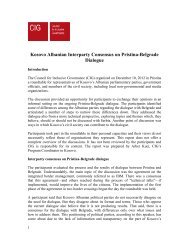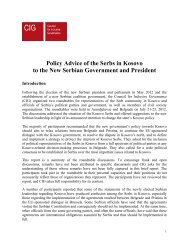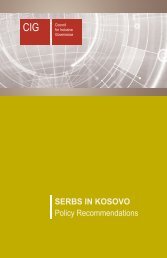Searching for Solutions for Kosovo's North (ENGLISH) - Cigonline.net
Searching for Solutions for Kosovo's North (ENGLISH) - Cigonline.net
Searching for Solutions for Kosovo's North (ENGLISH) - Cigonline.net
Create successful ePaper yourself
Turn your PDF publications into a flip-book with our unique Google optimized e-Paper software.
A participant from the north offered a list of problems of key concern to the<br />
people in the north. These included economic development, unemployment,<br />
identity, the return of refugees, restitution of property, missing persons, legal<br />
protection, and resolution of outstanding court cases. An Albanian speaker noted<br />
that the practical problems in the north are the same as in the south. Courts are<br />
not functioning properly. Electricity shortages, water supply, and unemployment<br />
are just as bad among Albanians. Another speaker said that these are all status<br />
issues. “You can’t have rule of law in the north without resolving the status, in<br />
essence without first agreeing on whose laws to apply there.” He predicted that<br />
unless the internationals act boldly the north would remain a frozen conflict <strong>for</strong><br />
years to come. A Serb participant agreed that the frozen conflict would continue<br />
until Serbia and Kosovo know where their borders are. He added that Belgrade<br />
does not want all of Kosovo. “When it says both Kosovo and the EU, it means<br />
north Kosovo and the EU.”<br />
The issue of identity was raised by a number of participants. A number of Serbs<br />
said the term “Kosovar” is being imposed on them. “I have been a Serb <strong>for</strong><br />
fifty years and don’t want to change my identity now.” But some other speakers<br />
said Kosovar doesn’t mean Albanian. “The Albanians don’t like this term either.”<br />
It’s an adjective meaning belonging to Kosovo. In other words, it means an<br />
inhabitant of Kosovo.<br />
Pristina and the <strong>North</strong><br />
An Albanian participant from Kosovo rejected border adjustment or partition as<br />
an option. He called <strong>for</strong> compromise. “The Rambouillet Accord, the Ahtisaari<br />
Plan, and Kosovo’s Constitution were all compromises.” He explained that the<br />
Albanians themselves struggled to understand the notion of compromise <strong>for</strong><br />
some time but have now understood that they need to create an understanding<br />
with the Serbs in the north and want to jointly think of solutions based on<br />
compromise. He said that Albanians and Serbs should focus on the reasons<br />
to live together, not just list reasons why they cannot live together. “Kosovo is<br />
neither the first nor the last state to function as a multiethnic state. A multiethnic<br />
state itself is a compromise.” He reported that Kosovo’s government has<br />
willingness and funds to make the north into a normal and prosperous part of<br />
Kosovo, but this could be achieved only when we begin to list the possibilities,<br />
not impossibilities, <strong>for</strong> co-existence.” The speaker also said that the Kosovo<br />
government is willing to establish a dialogue and communication with “the<br />
people in the north” but did not specify who these people would be. He would,<br />
however, accept dialogue with the mayors of the Serb municipalities in the north<br />
in their private capacities.<br />
The dispute is between Belgrade and Pristina, not between Serbs from Kosovo<br />
and Pristina, a speaker from Kosovo asserted. “Serbia is applying active<br />
10





